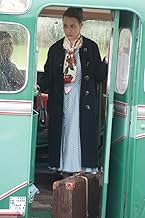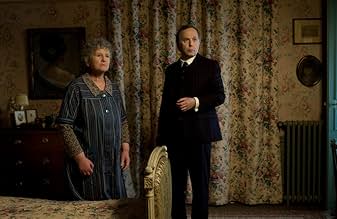Les femmes du 6e étage
- 2010
- Tous publics
- 1h 44min
NOTE IMDb
7,1/10
11 k
MA NOTE
Dans le Paris des années 60, la vie d'un couple conservateur est bouleversée par un groupe de servantes espagnoles vivant dans le même bâtiment.Dans le Paris des années 60, la vie d'un couple conservateur est bouleversée par un groupe de servantes espagnoles vivant dans le même bâtiment.Dans le Paris des années 60, la vie d'un couple conservateur est bouleversée par un groupe de servantes espagnoles vivant dans le même bâtiment.
- Réalisation
- Scénario
- Casting principal
- Récompenses
- 2 victoires et 3 nominations au total
Avis à la une
This is a pure delight. The director, Philippe Le Guay, has the perfect touch, never too light, never too heavy. And he is supported in this delicate balancing act by a marvellous cast, whose timing, tone and style are all perfectly attuned. The central performance in the film is given by the French comic actor Fabrice Luchini, an intelligent simpleton, a naïve bourgeois who has unexpectedly been let loose on Life. Luchini is a true marvel, a world class talent at understated comedy. He has at times the innocent puzzlement of silent comedian Harry Langdon come over his face, a kind of infantile bewilderment, but he is equally capable of snarling arrogantly as a domineering bourgeois buffoon and demanding that his boiled egg must boil for precisely three and a half minutes. He even admits that if he gets the correctly prepared egg in the morning, the rest of his day is glorious, but if he gets an egg which is too hard, his day is ruined. The task set to his maid is therefore going to determine his every day's mood! Luchini owns a large house in Paris (apparently, from what I could glimpse of a park scene, intended to be within walking distance of the quiet and sleepy Parc Monceau). He has inherited it and a prosperous brokerage and investment management business from his father. The film is set in 1962. Every day he goes to work to advise rich people how to invest their money. One of his clients is a glamorous rich widow, played unexpectedly in a cameo performance by the dazzler Audrey Fleurot from the police series ENGRENAGES (SPIRAL, 2005 onwards). Some wonderful laughs come from this association. Fleurot is reputed to be a man-eater, and Luchini's wife is worried that she will steal him from her, but little does she realize that he has barely noticed Fleurot (if you can imagine anyone not noticing Fleurot, which I cannot). This is a mere side event to the main tale. Much of Luchini's huge 19th century house is rented out to other families, and the maids of all of these haute-bourgeois people including his own live together in squalor in small servants' rooms on the sixth floor, hence the title of the film. Only one maid is of the traditional sort, an elderly Bretonne maid from Britanny, and she departs near the beginning of the film. All the rest are gabbling and gregarious Spanish women, who evidently in the 1960s were flocking to Paris to earn money to send home. They form their own tightly-knit sub-culture, invisible to their employers. Anyone who has been to Hong Kong will be familiar with the myriads of Philippino maids who are strewn all over Central every Sunday chattering away to each other in Tagalog. It is very much the same phenomenon. Luchini is married to the ultimate bourgeoise wife, formerly 'a country girl', who is now ruthlessly climbing the social ladder and, wallowing in spoilt self-pity, 'exhausts' herself every day having lunch with her friends and buying expensive dresses. She is played to perfection by Sandrine Kiberlain, veteran of 48 films, who is so often cast as a wife. Admirers of the classic L'APPARTEMENT (THE APARTMENT, 1996, see my review) will recall her waiting at the airport for her husband at the end of the film, with her wan smile and her freckles. But the main action of this film concerns the Spanish maids. While their spoilt rich employers below live lives of stultifying boredom and pointlessness, these impoverished maids, when they are not rushing off to mass and crossing themselves devoutly (all but the sullen one who has become an atheist because her parents were murdered in front of her by Franco's men), have tremendous fun, play the guitar, cook paella, dance a bit of flamenco, and live a vivacious life of their own in their rarified micro-climate on the sixth floor. When his Bretonne maid, who had served the family for thirty years, leaves, Luchini and his wife desperately need a replacement. The dishes are piled high in the sink, the lazy Kiberlain does not know how to work a washing-machine, and Luchini is desperate because he does not have a clean shirt left to wear to work. What can these poor suffering spoilt rich people do? A miracle occurs: one of the Spanish women has just had her niece turn up from Spain, a beautiful thirty-something played with inspired vivacity and satirical demeanour by Natalia Verbeke. She is an amazing actress, born in Argentina in 1975, moved to Spain was she was eleven, lived with a bullfighter, and has appeared in many Spanish TV series and films. When she becomes the new maid, a new life opens up for Luchini, and he realizes that he prefers the maids on the sixth floor for company to his own boring wife and his empty life. And he begins to fall for Natalia, which is hardly surprising, as she is so alluring. The film is at once a tasteful satire on the vacuities of the empty lives of the upper middle classes, a hilarious comedy, a sad commentary, a poignant insight into the silent suffering of people without any money, and the shattering clash of cultures which occurs when someone steps out of the one world and into the other. The film is such a joy, and its satire is so affectionate and gentle (which perhaps makes it all the more devastating), that we learn a lot about Life. And Life is in short supply these days. But prepare to laugh yourself silly, while crying sometimes. Those are the best films, aren't they?
The nice thing about "The Women on the 6th Floor" is that it stops itself just short of being an important film with a big statement. I can't help but think of it as a lighter cousin to "The Help"; while "The Help" shoved its self-righteous social consciousness right into the viewer's face, this French comedy chooses to remain a silly romantic comedy and keep the social commentary as subtext. The wealthy protagonist isn't out to change world orders, and he really isn't all that progressive (like Emma Stone's character in The Help), he just wants to get into the Spanish maid's pants. That means the movie got a lot less attention (and would have even if we eliminated the element of Americans' strange refusal to read subtitles) but it's a lot more entertaining, a lot less irritating, and not any more shallow as far as social commentary goes.
It isn't quite a great film. It's very naive, very unrealistic, and French cinema buffs may point out that it's a throwback to films made over half a century ago. The Spanish characters are extremely stereotypical, and the romance makes less and less sense as the film goes on, most jarringly in the incredibly silly, entirely unconvincing, saccharine ending, which almost ruined the whole thing for me. Nevertheless, it's funny and enjoyable throughout, Fabrice Luchini is superb in the lead, and all the supporting characters (even the stereotypical maids) are wonderfully crafted. And interestingly, it's the ignoble motivation of the protagonist that makes him much more compelling than Emma Stone in "The Help"; as unrealistic as the story is, the character is quite real, and makes for a delightful comedic protagonist, which in turns leads to a delightful little movie.
It isn't quite a great film. It's very naive, very unrealistic, and French cinema buffs may point out that it's a throwback to films made over half a century ago. The Spanish characters are extremely stereotypical, and the romance makes less and less sense as the film goes on, most jarringly in the incredibly silly, entirely unconvincing, saccharine ending, which almost ruined the whole thing for me. Nevertheless, it's funny and enjoyable throughout, Fabrice Luchini is superb in the lead, and all the supporting characters (even the stereotypical maids) are wonderfully crafted. And interestingly, it's the ignoble motivation of the protagonist that makes him much more compelling than Emma Stone in "The Help"; as unrealistic as the story is, the character is quite real, and makes for a delightful comedic protagonist, which in turns leads to a delightful little movie.
THE WOMEN ON THE 6TH FLOOR (Les femmes du 6ème étage) is a delightful bit of French pastiche that entertains while it also provides insight into several problems - immigration, class distinction, rich controlling poor, and the polar extremes of between the wealth and the working class. Fortunately the story as written by Jérôme Tonnerre and writer/director Philippe Le Guay takes place in the 1960s, offering the audience to glance back at period when social reforms were in the gestational phase and in doing so the film allows the comedy to reign - a fact that makes the reality eventually more poignant.
The story takes place in Paris in 1963 in an elegant neighborhood where Jean-Louis Joubert (Fabrice Luchini) is a serious but uptight stockbroker, married to Suzanne (Sandrine Kiberlain), a starchy class-conscious woman and father of two arrogant teenage boys, (Camille Gigot and Jean-Charles Deval) currently in a boarding school. Jean-Louis lives a steady yet boring life while Suanne busies herself with luncheon appointments, hair appointments, charities, etc. Jean-Louis' mother had been living with the Jouberts until her recent death and now Suzanne forces Jean-Louis to move all of the deceased woman's things to the attic on the 6th floor, an act that infuriates the longtime French maid Germaine (Michèle Gleizer) who leaves the household in disgust. Naturally everything deteriorates an Suzanne must find a new maid. She encounters Maria (Natalia Verbeke) recently immigrated from Spain, offers her a trial employment, and Maria, who becomes friends with the group of maids who live in the disgusting squalor of the 6th floor of the building: naturally these Spanish maids bond and help Maria bring the Joubert household to a state of perfection. Jean-Lois is thrilled with the new maid and discovers the other maids, hears their problems with the sewer and other poor conditions, and sets out to befriend these wonderful ladies who are living in his building : the redoubtable Carmen Maura, Lola Dueñas, Berta Ojea, Nuria Solé, and Concha Galán. These lovely and deeply appreciative lively Spanish maids help Jean- Louis to become open to a new civilization and a new approach of life. In their company - and especially in the company of beautiful Maria - Jean-Louis will gradually become another man, a better man.
The acting is first rate, the subplots embroider the main story with fine finesse, and the sense of the transformation of one wealthy but emotionally vapid man into the loving charmer he becomes makes for a very fine comedy. The ending (three years later) is a bit vapid and cheapens the story quality, but by that time the audience is so entranced with this new vision of camaraderie that it matters little. This is a refreshing, well made, exceptionally entertaining film that boast a particularly fine cast of ensemble actors. In French and Spanish with English subtitles. Grady Harp, March 12
The story takes place in Paris in 1963 in an elegant neighborhood where Jean-Louis Joubert (Fabrice Luchini) is a serious but uptight stockbroker, married to Suzanne (Sandrine Kiberlain), a starchy class-conscious woman and father of two arrogant teenage boys, (Camille Gigot and Jean-Charles Deval) currently in a boarding school. Jean-Louis lives a steady yet boring life while Suanne busies herself with luncheon appointments, hair appointments, charities, etc. Jean-Louis' mother had been living with the Jouberts until her recent death and now Suzanne forces Jean-Louis to move all of the deceased woman's things to the attic on the 6th floor, an act that infuriates the longtime French maid Germaine (Michèle Gleizer) who leaves the household in disgust. Naturally everything deteriorates an Suzanne must find a new maid. She encounters Maria (Natalia Verbeke) recently immigrated from Spain, offers her a trial employment, and Maria, who becomes friends with the group of maids who live in the disgusting squalor of the 6th floor of the building: naturally these Spanish maids bond and help Maria bring the Joubert household to a state of perfection. Jean-Lois is thrilled with the new maid and discovers the other maids, hears their problems with the sewer and other poor conditions, and sets out to befriend these wonderful ladies who are living in his building : the redoubtable Carmen Maura, Lola Dueñas, Berta Ojea, Nuria Solé, and Concha Galán. These lovely and deeply appreciative lively Spanish maids help Jean- Louis to become open to a new civilization and a new approach of life. In their company - and especially in the company of beautiful Maria - Jean-Louis will gradually become another man, a better man.
The acting is first rate, the subplots embroider the main story with fine finesse, and the sense of the transformation of one wealthy but emotionally vapid man into the loving charmer he becomes makes for a very fine comedy. The ending (three years later) is a bit vapid and cheapens the story quality, but by that time the audience is so entranced with this new vision of camaraderie that it matters little. This is a refreshing, well made, exceptionally entertaining film that boast a particularly fine cast of ensemble actors. In French and Spanish with English subtitles. Grady Harp, March 12
A great review by Robert Beames (coulden't have done it better myself!!) It has been given the more toner-friendly English language title of Service Entrance, but comic French drama Les Femmes Du 6eme Etage translates literally as The Women on the 6th Floor. Shown out of competition in Berlin, the film was very warmly received thanks in part to the performances of its sweet and amiable leading man, Fabrice Luchini, and its beautiful Spanish leading lady played by Natalia Verbeke. These actors combine with the film's leisurely pacing and entertaining scenario to ensure that it is a winsome and inoffensive crowd-pleaser.
The film, set in the 1960s, follows a wealthy, middle-aged Parisian stockbroker named Jean-Louis (Luchini) whose long-standing maid quits following a row with his demanding wife Suzanne (Sandrine Kiberlain). Unable to clean up after themselves, the couple desperately need a new maid. But when Suzanne's high society friends insist French maids aren't the done thing anymore, she enlists the help of Maria (Natalia Verbeke), a feisty, young Spanish immigrant. Jean-Louis forms an instant and obsessive attraction to her and to all things Spanish, soon striking up unlikely friendships with all the Spanish ladies who live in the servant's quarters above his home – a place he knows nothing about despite living in the building his entire life. Worlds collide and good-natured japes ensue as he helps each lady adjust to life in France whilst himself inheriting a new found love of life.
I don't think it's necessarily a coincidence that both the more shamelessly enjoyable films I've seen here up to now have been broad comedies about cultural difference and histories of mass immigration – with Almanya looking at German-Turks and Service Entrance exploring the relationship, and the comedy that comes of misunderstanding, between the French and their Spanish workforce. Immigration is still a political hot potato issue in these countries, as it remains in much of Europe, and maybe light-hearted comedy is seen as the best way to preach tolerance, reaching a bigger audience than earnest polemic. In mocking bigotry and by setting it in the past (as an old fashioned attitude) perhaps it is felt that people might be less inclined to identify with those views.
In any case both films are funny and have their hearts firmly in the right place. This French offering is gentler and less ballsy than it's Turkish-German counterpart, but no less enjoyable. The character of Jean-Louis is incredibly easy to like, being child-like in his enthusiasm for his new-found interest in Spain. The character of Suzanne is also refreshingly balanced and nuanced. She'd usually be a two-dimensional figure we would be encouraged to dislike in order to make it permissible for Jean-Louis to consider romance with Maria and yet the film doesn't go down that route: she can be annoying and insensitive but she isn't a nasty person. Maria and the other Spanish ladies are also a joy to watch as they interact with one another and fuss over cheerful little Jean-Louis.
Service Entrance is the filmic equivalent of a soufflé and certainly not a tough watch typical of the standard festival fare. Indeed it falls into the dubious realm of the "feel good" movie. But sandwiched, as it is here, between two-hour long Shakespeare adaptations, Bela Tarr movies, Argentinian slow cinema and films about nuclear disasters, it is exactly the kind of film you need to see in order to keep sane. It is difficult to say whether wider criticism in France will be anything like as positive when removed from this context on theatrical release, but here it offered exactly what was needed and nobody appreciated that more than I.
The film, set in the 1960s, follows a wealthy, middle-aged Parisian stockbroker named Jean-Louis (Luchini) whose long-standing maid quits following a row with his demanding wife Suzanne (Sandrine Kiberlain). Unable to clean up after themselves, the couple desperately need a new maid. But when Suzanne's high society friends insist French maids aren't the done thing anymore, she enlists the help of Maria (Natalia Verbeke), a feisty, young Spanish immigrant. Jean-Louis forms an instant and obsessive attraction to her and to all things Spanish, soon striking up unlikely friendships with all the Spanish ladies who live in the servant's quarters above his home – a place he knows nothing about despite living in the building his entire life. Worlds collide and good-natured japes ensue as he helps each lady adjust to life in France whilst himself inheriting a new found love of life.
I don't think it's necessarily a coincidence that both the more shamelessly enjoyable films I've seen here up to now have been broad comedies about cultural difference and histories of mass immigration – with Almanya looking at German-Turks and Service Entrance exploring the relationship, and the comedy that comes of misunderstanding, between the French and their Spanish workforce. Immigration is still a political hot potato issue in these countries, as it remains in much of Europe, and maybe light-hearted comedy is seen as the best way to preach tolerance, reaching a bigger audience than earnest polemic. In mocking bigotry and by setting it in the past (as an old fashioned attitude) perhaps it is felt that people might be less inclined to identify with those views.
In any case both films are funny and have their hearts firmly in the right place. This French offering is gentler and less ballsy than it's Turkish-German counterpart, but no less enjoyable. The character of Jean-Louis is incredibly easy to like, being child-like in his enthusiasm for his new-found interest in Spain. The character of Suzanne is also refreshingly balanced and nuanced. She'd usually be a two-dimensional figure we would be encouraged to dislike in order to make it permissible for Jean-Louis to consider romance with Maria and yet the film doesn't go down that route: she can be annoying and insensitive but she isn't a nasty person. Maria and the other Spanish ladies are also a joy to watch as they interact with one another and fuss over cheerful little Jean-Louis.
Service Entrance is the filmic equivalent of a soufflé and certainly not a tough watch typical of the standard festival fare. Indeed it falls into the dubious realm of the "feel good" movie. But sandwiched, as it is here, between two-hour long Shakespeare adaptations, Bela Tarr movies, Argentinian slow cinema and films about nuclear disasters, it is exactly the kind of film you need to see in order to keep sane. It is difficult to say whether wider criticism in France will be anything like as positive when removed from this context on theatrical release, but here it offered exactly what was needed and nobody appreciated that more than I.
The movie plot about the life of Spanish immigrants in France in the 1960s showing experiences of poor maids as immigrants and adequately reflecting us how was the life of that time . In 1960s Paris, a conservative couple's lives are turned upside down by various Spanish maids . The peculiar marriage called Jean-Louis Joubert (Fabrice Luchini) and Suzanne Joubert (Sandrine Kiberlain) carry out a different life , as Jean-Louis is a hard-working executive and Suzanne is a snobbish wife . The affluent man and the selfish woman live a dull life and they have two arrogant children in a boarding school . At least until due to fortuitous events , there appears Maria (Natalia Verbeke) , the beautiful new maid at the service of Jean-Louis' family, makes him discover the servants' quarter on the sixth floor of the luxurious building he owns and lives in . There lives a community (Carmen Maura as Concepción Ramirez , Lola Dueñas as Berta Ojea as Dolores Carbalan , Nuria Solé as Teresa and Concha Galán as Pilar) of likable Spanish maids , they have said goodbye their families and went abroad . There take place the problems to adapt into a new life ; but later on , they discover a new and agreeable existence . The maids will help Jean-Louis to open to a new culture , introducing him a joyful Spanish group and a new approach of life . In their help and more precisely in the company of charming Maria , Jean-Louis to be turned into a good and philanthropist man .
This interesting film is full of humor , drama , touching scenes and good feeling . It is a simple , dramatic and humorous portrait of a time when the Spanish people had to go other countries in order to encounter a work . This amusing as well as funny picture deals about lives of the immigrants with a minor support in their live condition and including a touching and emotive finale . As in Spain of the 50s and 60s ruled by General Franco there's no job , there's no money , and there's no option for the poor people but to emigrate to a foreign country and attempting to encounter work . As it concerns about the Spanish way of life of a crowd of maids , their habits , costumes ; at the same time they improve the serious but uptight stockbroker who lives a steady yet boring life , being suddenly changed when appear the Spanish maids ; as Jean-Louis will gradually become another man, a better man . Actors are frankly magnificent with a first-rate acting for whole cast . Sensational Fabrice Luchini along with the wife played Sandrine Kinberlain and a gorgeous as well as sympathetic Natalia Verbeke . Special mention to the group of Spanish maids magnificently performed by Carmen Maura , Lola Dueñas , Berta Ojea , among others . Colorful and evocative cinematography by Jean Claude Larrieu . Imaginative as well as sensitive original Music by Jorge Arriagada , Raul Ruiz's usual . It was a success among spectators, as well as a hit smash in the various film festivals it took part in ; as it achieved Prix d'interprétation à Natalia Verbeke au festival Sarlat 2010 .
The motion picture was very well directed by Philippe Le Guay . Philippe Le Guay took inspiration from his own childhood , his father was a stockbroker like Jean-Louis Joubert in the film and he himself had a Spanish maid. This was the number one comedy smash hit from this director . He's a good writer and filmmaker who has directed a few movies , many of them starred by his fetish actor , Fabrice Luchini , such as "Cycling with Moliere" , "The Cost of Living" ¨L'année Juliette¨ and this ¨The Women on the 6th Floor" , his best picture .
This interesting film is full of humor , drama , touching scenes and good feeling . It is a simple , dramatic and humorous portrait of a time when the Spanish people had to go other countries in order to encounter a work . This amusing as well as funny picture deals about lives of the immigrants with a minor support in their live condition and including a touching and emotive finale . As in Spain of the 50s and 60s ruled by General Franco there's no job , there's no money , and there's no option for the poor people but to emigrate to a foreign country and attempting to encounter work . As it concerns about the Spanish way of life of a crowd of maids , their habits , costumes ; at the same time they improve the serious but uptight stockbroker who lives a steady yet boring life , being suddenly changed when appear the Spanish maids ; as Jean-Louis will gradually become another man, a better man . Actors are frankly magnificent with a first-rate acting for whole cast . Sensational Fabrice Luchini along with the wife played Sandrine Kinberlain and a gorgeous as well as sympathetic Natalia Verbeke . Special mention to the group of Spanish maids magnificently performed by Carmen Maura , Lola Dueñas , Berta Ojea , among others . Colorful and evocative cinematography by Jean Claude Larrieu . Imaginative as well as sensitive original Music by Jorge Arriagada , Raul Ruiz's usual . It was a success among spectators, as well as a hit smash in the various film festivals it took part in ; as it achieved Prix d'interprétation à Natalia Verbeke au festival Sarlat 2010 .
The motion picture was very well directed by Philippe Le Guay . Philippe Le Guay took inspiration from his own childhood , his father was a stockbroker like Jean-Louis Joubert in the film and he himself had a Spanish maid. This was the number one comedy smash hit from this director . He's a good writer and filmmaker who has directed a few movies , many of them starred by his fetish actor , Fabrice Luchini , such as "Cycling with Moliere" , "The Cost of Living" ¨L'année Juliette¨ and this ¨The Women on the 6th Floor" , his best picture .
Le saviez-vous
- AnecdotesPhilippe Le Guay took inspiration from his own childhood. His father was a stockbroker like Jean-Louis Joubert in the film and he himself had a Spanish maid.
- GaffesIn the street, most (if not all) men wear hats, caps or Basque berets. In France, most men stopped wearing headgear in the 1950s (in cities at least). By 1960, the vast majority of men were hatless.
- ConnexionsFeatured in Ebert Presents: At the Movies: Épisode #2.13 (2011)
- Bandes originalesItsi Bitsi, Petit Bikini
(Itsy Bitsy Teenie Weenie Yellow Polkadot Bikini)
Music by Lee Pockriss
English lyrics by Paul Vance
French lyrics by Lucien Morisse and André Salvet
Performed by Dalida
© Emily Music Corporation and Music Sales Corporation
Avec l'aimable autorisation de Campbell Connelly France
(P) 1960 Barclay
Avec l'autorisation de Universal Muis Vision
Meilleurs choix
Connectez-vous pour évaluer et suivre la liste de favoris afin de recevoir des recommandations personnalisées
- How long is The Women on the 6th Floor?Alimenté par Alexa
Détails
- Date de sortie
- Pays d’origine
- Sites officiels
- Langues
- Aussi connu sous le nom de
- The Women on the 6th Floor
- Lieux de tournage
- Sociétés de production
- Voir plus de crédits d'entreprise sur IMDbPro
Box-office
- Budget
- 7 000 000 € (estimé)
- Montant brut aux États-Unis et au Canada
- 719 823 $US
- Week-end de sortie aux États-Unis et au Canada
- 26 200 $US
- 9 oct. 2011
- Montant brut mondial
- 27 533 970 $US
- Durée1 heure 44 minutes
- Couleur
- Mixage
- Rapport de forme
- 1.85 : 1
Contribuer à cette page
Suggérer une modification ou ajouter du contenu manquant

Lacune principale
By what name was Les femmes du 6e étage (2010) officially released in India in English?
Répondre
![Regarder Bande-annonce [OV]](https://m.media-amazon.com/images/M/MV5BNTdmOTBjM2UtOTUyMS00NDViLWI4NWEtNmVhODc1NDVjN2NlXkEyXkFqcGdeQXRyYW5zY29kZS13b3JrZmxvdw@@._V1_QL75_UX500_CR0)



























